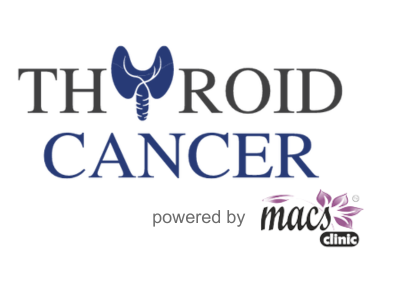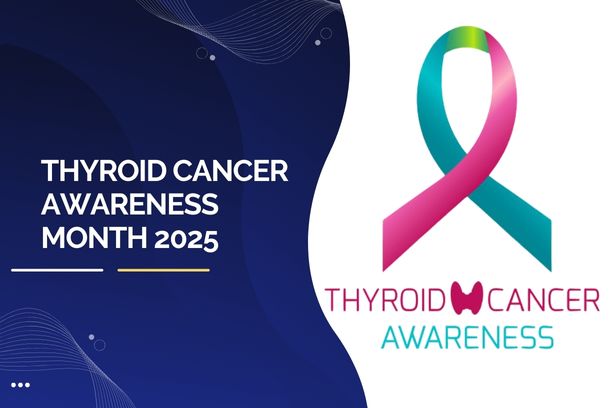Thyroid cancer, although relatively rare, is a form of cancer that affects the thyroid gland, a small, butterfly-shaped organ located at the base of the neck. It plays a key role in regulating the body’s metabolism through hormone production. With increasing awareness, thyroid cancer is being diagnosed more often than before. Globally, thyroid cancer is one of the fastest-growing cancers, particularly among women.
According to the World Health Organization, in 2020, there were approximately 586,000 new cases of thyroid cancer worldwide. In India, thyroid cancer incidence is also rising, with an estimated 20,000 new cases annually. As we observe September as Thyroid Cancer Awareness Month, it’s crucial to focus on spreading awareness, early detection, and treatment options to improve the lives of those affected.

Dr. Sandeep Nayak, a highly regarded surgical oncologist in India, shares:
“Raising awareness about thyroid cancer is crucial because early detection and timely treatment can significantly improve the outcome. Awareness is not just about knowing the symptoms, but also understanding the importance of regular check-ups and consultations.”
Thyroid Cancer Awareness Month offers an important opportunity to highlight these concerns and educate the public. With over two decades of experience in oncology, Dr. Nayak heads the MACS Clinic, where he specializes in thyroid cancer surgery and treatment. The clinic is known for its patient-centered approach, combining advanced diagnostic tools with multidisciplinary expertise to deliver both effective and compassionate care.
Let’s dive into how this month helps spread vital knowledge and encourage early detection.
What is Thyroid Cancer Awareness Month?

Thyroid Cancer Awareness Month is observed every September to raise awareness about thyroid cancer, encourage early detection, and provide support for those diagnosed with the disease. The month-long campaign aims to highlight the importance of understanding the disease, recognizing symptoms, and seeking timely treatment. The purple ribbon is used as a symbol of support for thyroid cancer patients, shedding light on this often overlooked type of cancer.
As part of the awareness drive, various events, fundraisers, and educational programs are held to help people understand the impact of thyroid cancer on individuals and their families. By sharing information, we can help prevent late-stage diagnoses and improve survival rates.
Why Raising Awareness Matters

Thyroid cancer is often detected at an early stage, largely because regular check-ups and medical evaluations help identify it before it progresses. Nevertheless, most people do not know that it has signs and often delay seeking medical attention. Awareness creates a chance for people to note symptoms like a lump in the neck, unexplained changes in voice, or swallowing problems. Early detection makes it much easier for treatment to be successful since thyroid cancer is highly curable when discovered early.
Awareness is also central to curbing the stigmatization of the disease. Through increased awareness, we can have an easier time creating a supportive environment for persons who have thyroid cancer. The more information people have regarding the disease, the earlier they will present themselves for medical attention, hence a better survival rate.
What if a person is diagnosed with thyroid cancer? Let’s find out the various types and treatments.
Understanding Thyroid Cancer

Thyroid cancer occurs when abnormal cells in the thyroid gland begin to grow uncontrollably. There are several types of thyroid cancer, including papillary, follicular, medullary, and anaplastic thyroid cancer. Papillary thyroid cancer has a relatively slow growth and a high percentage of survival. Follicular thyroid cancer similarly gives a good chance, but medullary and anaplastic thyroid cancers are aggressive and need proper treatment.
The exact cause of thyroid cancer is unknown, but some risk factors that can increase the chances of developing thyroid cancer. These are radiation exposure, family history, and gender, with females being more prone to developing thyroid cancer compared to males.
What signs should you look out for in thyroid cancer? Let us see the warning signs for you to stay ahead.
Common Symptoms to Watch For

If thyroid cancer symptoms are identified at an early stage, it can make a big difference in the result. Some of the common symptoms are:
* A painless lump in the neck
* Hoarseness of voice or change in voice
* Swallowing difficulty
* Unexplained weight loss
* Neck or throat pain
* Swollen lymph nodes in the neck
It’s essential to remember that these symptoms can be associated with conditions other than thyroid cancer. However, if any of these symptoms persist, it is crucial to consult a healthcare professional for proper evaluation.
What factors increase the risk of thyroid cancer? Let’s explore the risks and how you can protect yourself.
Risk Factors You Should Know
Although anyone can get thyroid cancer, some factors could raise the risk. They are:
- Age and gender: Women aged between 20 and 60 years have a greater risk.
- Family history: Family history of thyroid cancer or some specific genetic disorders can increase the possibility.
- Radiation exposure: A History of radiation exposure, particularly as a child, can raise the risk of thyroid cancer.
- History of thyroid disease: Having some thyroid diseases, including Hashimoto’s thyroiditis, could elevate the risk
“Understandably, these risk factors help individuals adopt preventive measures in regard to their health and undergo routine screening when needed,” says Dr. Sandeep Nayak.
How is thyroid cancer diagnosed? Let’s discuss the necessary tests and why screenings are important.
Diagnosis and Screening
Thyroid cancer is often diagnosed through a combination of physical exams, imaging tests, blood tests, and biopsy. Some common diagnostic tests include:
Ultrasound:
A non-invasive imaging test to check for lumps or abnormalities in the thyroid.

Fine-needle aspiration biopsy (FNA):
A test involves removing a small sample of thyroid tissue and analyzing it.

Blood tests:
What are the treatments for thyroid cancer? Let’s analyze the best routes to recovery.
Treatment Options
Thyroid cancer treatment varies based on cancer type and stage. The most common treatment forms are:
Surgery:
The most prevalent treatment is where the thyroid or a portion of it is removed.

Radioactive iodine therapy:
Usually applied after surgery to treat residual thyroid cancer cells.

Thyroid hormone replacement therapy:
Patients need synthetic thyroid hormones after thyroid removal for regular body function.

External radiation therapy and chemotherapy:
Used in more advanced cases or when surgery and radioactive iodine therapy are not sufficient.
The approach to treatment is personalized based on the individual’s condition and overall health. Many patients recover fully with proper treatment, especially when the cancer is diagnosed early.
What happens after surviving thyroid cancer? How do patients thrive after treatment?
Living with and Surviving Thyroid Cancer

Key Elements:
Living with thyroid cancer can be challenging, but with effective treatment and consistent care, many people go on to lead whole and healthy lives. Long-term follow-up is essential, often including regular check-ups, imaging tests, and hormone therapy to maintain health on track.
Survivors are encouraged to adopt a healthy lifestyle, including eating a balanced diet, staying physically active, managing stress, and avoiding habits that can hinder recovery. Maintaining regular communication with your healthcare team ensures that any changes are caught early and managed effectively.
Emotional well-being matters just as much. Joining thyroid cancer support groups can offer encouragement, practical tips, and a sense of connection with others who understand the journey. Sharing experiences not only provides comfort but also empowers survivors to move forward with confidence.
Let’s explore how you can help raise awareness and support those affected.
How to Get Involved This September

There are many ways you can contribute to the cause. You can:
* Attend fundraising events
* Post information on social media with the thyroid cancer ribbon symbol
* Support patients and survivors by joining support groups or offering emotional assistance
* Educate others about thyroid cancer and its symptoms
“By raising awareness, you help create a world where early detection and effective treatment are the norm, not the exception,” states Dr. Sandeep Nayak.
Final Thoughts
Thyroid cancer is a serious health condition, but if detected early and given proper treatment, the condition usually has a good prognosis. Thyroid Cancer Awareness Month is necessary to inform people about the importance of recognizing symptoms, seeking early treatment, and supporting patients with this disease. As long as we keep raising awareness, we can change lives for those who have thyroid cancer.

